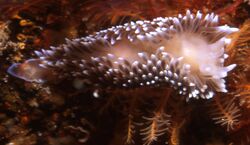Biology:Antiopella longidentata
| Antiopella longidentata | |
|---|---|

| |
| A silvertip nudibranch, either J. longidentatus or J. capensis | |
| Scientific classification | |
| Kingdom: | |
| Phylum: | |
| Class: | |
| (unranked): | clade Heterobranchia
clade Euthyneura clade Nudipleura clade Nudibranchia clade Dexiarchia clade Cladobranchia |
| Family: | |
| Genus: | |
| Species: | J. longidentatus
|
| Binomial name | |
| Janolus longidentatus Gosliner, 1981[1]
| |
Antiopella longidentata (Gosliner, 1981), previously named Janolus longidentatus, the medallion silvertip nudibranch, is a species of nudibranch, or sea slug. It is a marine gastropod mollusc in the family Proctonotidae.
Apart from striking differences in the egg ribbons, individuals of this species are externally not distinguishable from the Cape silvertip nudibranch Antiopella capensis.
Distribution
This species is endemic to the South African coast and is found on both sides of the Cape Peninsula, from the intertidal border to at least 30 m.[2]
Description
The medallion silvertip nudibranch grows up to 40mm in total length. It is a pale-bodied nudibranch with dark- to tan-coloured cerata with white tips. Its rhinophores are white and rolled. They are separated from one another by an opaque white spherical mass of unknown function called the rhinophoral crest.
Ecology
This species of nudibranch feeds on a bryozoan, the spiral moss animal, Menipea triseriata. The egg mass is a flat spiral of capsules with 5-7 eggs per capsule.[3] The egg ribbon of the Cape silvertip nudibranch is globular, convoluted and has numerous eggs per capsule.
References
- ↑ Gosliner T. M. (1981). "The south African Janolidae (Mollusca, Nudibranchia) with the description of a new genus and two new species". Annals of the South African Museum 86(1): 1-42.
- ↑ GOSLINER, T.M. 1987. Nudibranchs of Southern Africa ISBN:0-930118-13-8
- ↑ ZSILAVECZ, G. 2007. Nudibranchs of the Cape Peninsula and False Bay. ISBN:0-620-38054-3
Wikidata ☰ Q6805099 entry
 |

